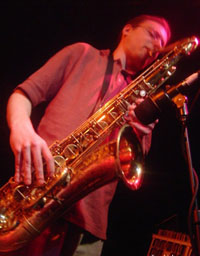
Jeff Sackmann is a composer, saxophonist, and bandleader with an embarrasing affection for bubblegum pop.
In an effort to create serious music for his 15-piece jazz orchestra, Oy Christina!, he has combined baroque fugue with Justin Timberlake, introduced serialism to Eminem, and spiced up dance mixes with Coltrane changes. For his trio Single White Female, among others, he has written several dozen pieces for small jazz ensemble that occasionally bridge the gap between chamber music and traditional combo playing.
As a saxophonist, Jeff spent several months performing with Clyde Stubblefield, the original funky drummer. He plays with a variety of rock bands in New York City and spent three years as the music director for the swing band Little Red and the Howlers.
Hailing originally from Spokane,Washington, he spent his undergraduate years at New York University, did graduate work in English Literature at the University of Wisconsin-Madison,and studied music at Berklee.
|

2.04.2006
The Curse of the Saxophone Quartet
I never suspected I'd have any relationship with them at all, but I've discovered I have a love-hate relationship with saxophone quartets. I didn't go to music school so I didn't spend years playing them and I've certainly never sought them out. But, as I'd imagine many saxophonists can attest to, quartets seek us out. And--let's just get it out there--SO many of them are SO bad.
I don't think any other common chamber music form has so many dippy, meaningless contributions. I, of course, am completely objective here. Really. I suspect the problem stems from some combination of the vast number of saxophonists out there who decide they can write a piece or two, and the lack of any established classics in the genre to use as a reference point. Whatever the reason, it's a rare saxophone quartet that gets me very excited.
Two gigantic exceptions are Michael Torke's "July" and Charles Wuorinen's "Saxophone Quartet (1992)". Torke has written a fair amount of music involving saxophones, so he not only knows how to write for the instrument, but he knows that you don't press some magic "jazz" button, insert a cute glissando or two, and throw in a funky flat five. To put it another way, "July" is idiomatic and all that, but it doesn't shout, "hey, lookee here, I wrote a saxophone quartet!"
Wuorinen's quartet, of course, is a radically different piece of music, but it works for the same reasons. It's not too self-consciously saxophonic (I apologize--I do slap myself upside the head every time I use the word "saxophonic"), and it differs from his other chamber music in a way that makes sense for the instrument. Even though I have no interest in writing serial music, I'd be thrilled if Wuorinen's quartet became the reference point the form is missing. It extends the vocabulary of the quartet form without making unusual demands on the players, and like any great piece, it points the way toward several more extensions and dozens more pieces.
In talking about my two favorite quartets (and I really mean favorite--Wuorinen's piece has been on my playlist at home for months now, right between "I Wish" by Stevie Wonder and Verklarte Nacht), you can figure what my complaints will be about the rest of the genre. Because the saxophone has always been associated with jazz, quartets tend be jazz-tinged as well, sometimes to the extent of including an improvised solo and/or lengthy passages in which the baritone plays a walking bass line. Rather than offering a new take on, say, the string quartet, such pieces tend to be more suggestive of barbershop singing.
Whatever you think of barbershop quartets, I think we need a collective groan right about now.
As you might have guessed by now, yes, I'm working on a saxophone quartet. And yes, I think it will avoid most of the traps that usually make me grimace at the mere listing of a quartet performance. Once one grasps the basics of writing for the instrument (and, if nothing else, fifteen years of playing the damn thing has gotten me that much), I suspect the best approach is to forget the implications of the genre altogether. If you're going to put a whole bunch of saxophones on stage together, it's already enough of a departure from your typical chamber music sound.
Eventually, I'll post about my plans for this piece. In the meantime, I'm getting excited about this Michael Gordon premiere tonight. Now there's a composer whose saxophone quartet I would like to hear.
posted by Jeffrey Sackmann
|
| |



